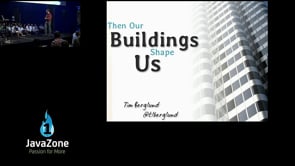Winston Churchill famously said, “First we shape our buildings, and afterwards, our buildings shape us.” Software developers are constantly debating their choices of language, platform, editor, methodology, and even where to put the curly braces. The robust internal dialog in our community is a healthy thing, but our debates are often focused on the wrong topics. Have you ever compared languages by performance benchmarks? Platforms by alleged claims of developer productivity? Methodologies by feature velocity? Then there is a very good chance you’re doing it wrong.
Rather than focus on the material content of our debates—language performance, editor productivity, methodological velocity—we should take Churchill’s advice and think about the form of our choices. How will our choice of language influence the way we solve future problems? What assumptions does our methodology make about the nature of work? How will our choice of database affect the kinds of problems we think of as solvable? Drawing on lessons from building architecture, literature, music, the visual arts, and even software itself, we’ll learn the priority of interpreting the form of things before attempting to understand their content. You’ll come away with powerful new intellectual tools to help you navigate the perennial debates that technology leaders engage over and over—and you may never look at software architecture the same way again.
Video Producer: http://javazone.no/


Pingback: Software Development Linkopedia April 2013